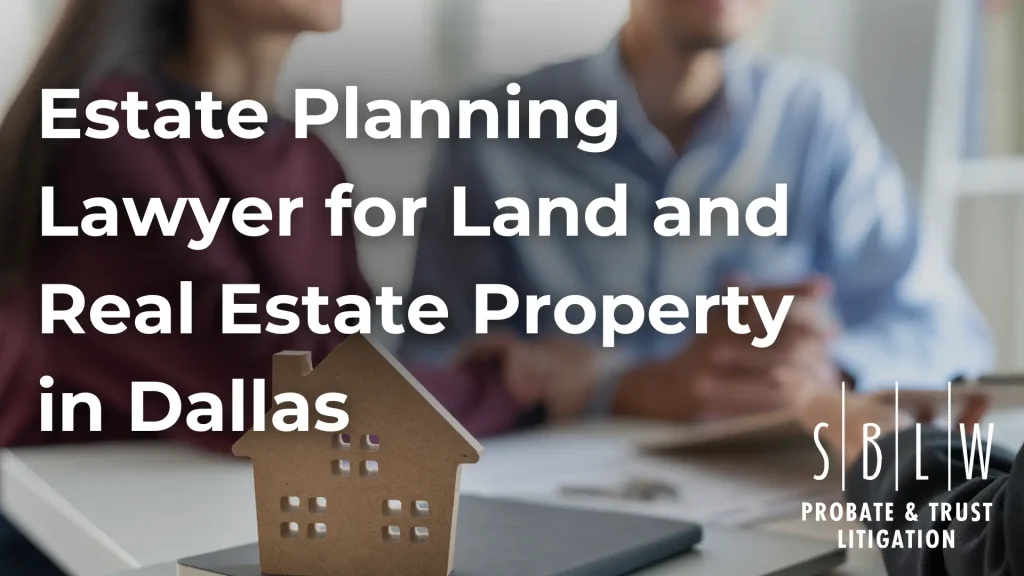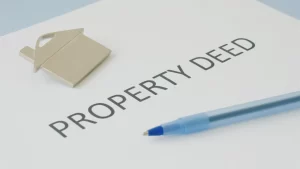
If you have real estate you want to include in your estate plan, contact Staubus, Blankenship, Legere and Walker PLLC immediately. An experienced estate planning attorney in Dallas can help safeguard your assets during your lifetime and when you die.
Estate planning isn’t only about informing your loved ones of your wishes. It also involves protecting your assets. If you own real estate, creating the appropriate documents to ensure the right people get your property when you’re gone is crucial. You can pass these assets to your family without confusion or legal disputes.
At Staubus, Blankenship, Legere and Walker PLLC, our legal team has over 100 years of combined experience in estate planning. We will review the real estate and land you own to establish an estate plan most beneficial for you and your loved ones. Call our Dallas estate planning attorneys at (214) 833-0100 to schedule a consultation today.
How to Include Real Estate Property in an Estate Plan
Real estate isn’t limited to a person’s residence. It can include a vacation home, rental property, building, or land. You can set up your real estate property to distribute to your beneficiaries upon your death, minimize estate taxes, and potentially avoid probate.
Below are the primary types of real estate and how to protect them.
Primary Residence
You must consider the way your primary residence is titled during estate planning. Typically, you title your home in both spouses’ names when you are married. Your primary residence can qualify for the homestead exemption, allowing a tax break. However, it doesn’t benefit your spouse when you die because the home doesn’t automatically transfer to them.
You can ensure your spouse assumes automatic ownership of your primary residence upon your death with a joint tenancy with a right of survivorship agreement. The agreement allows your home to pass to your spouse without going through probate. They won’t have to wait for a judge to validate your will and authorize the transfer of this asset.
Setting up a transfer-on-death deed (TOD) is necessary if you’re single and want your beneficiary to avoid probate. You can name anyone as the beneficiary of your primary residence. The person you choose will receive your home or land when you die.
Creating a qualified personal residence trust (QRPT) is another option for leaving behind your home in your estate plan. A QRPT is a type of irrevocable trust.
As the grantor of the trust, you maintain interest in the property and can remain in your home for a predetermined timeframe. Continuing to live in the home reduces the property’s value, minimizing your beneficiary’s estate and gift taxes.
When the term ends, the trust’s beneficiary assumes ownership if you are still alive. However, if you die before the end of the term, the residence will return to your estate, preventing your family from receiving tax benefits.
Vacation Home
If you own a vacation home, you should consider setting up a trust or limited liability company (LLC). It protects the property and simplifies transferring ownership to your surviving family upon your death.
You can establish the rules for maintaining and using the home with an LLC or trust. You can also determine what should happen to it when you die. You might decide you want it to stay in the family and pass to the next generation. Or you could have your beneficiary sell it and keep the proceeds.
A vacation home owned by an LLC is also beneficial because an LLC protects your personal assets from creditors. For example, if a creditor files a claim against your LLC for unpaid bills, they can only use those assets to satisfy the debt. They can’t use your personal assets to repay what you owe.
Rental Property
Owning rental property provides an additional income stream. However, rental properties come with multiple risks. You can face lawsuits and other legal issues while you’re alive if a renter gets hurt on the property. You can set up an LLC to own the rental property to avoid personal liability.
Establishing a living trust for the property provides additional benefits for your loved ones. You minimize estate taxes, avoid probate, and allow someone you appoint to manage the asset if you’re incapacitated and can’t do yourself.
Common Types of Deeds in Texas
 A deed is a legal document used to transfer property ownership to another person. Using a deed for real estate in estate planning is beneficial to accomplish specific goals. The most common deeds in estate planning include:
A deed is a legal document used to transfer property ownership to another person. Using a deed for real estate in estate planning is beneficial to accomplish specific goals. The most common deeds in estate planning include:
- Transfer-on-death (TOD) deed – A TOD deed allows you to transfer your interests in real estate property or land to someone else when you die. The person you leave the asset to won’t have to go through probate to assume ownership. They will receive it upon your death and can use it how they want.
- Life estate deed – A life estate deed benefits you and your beneficiary. You can transfer ownership of the land or home while retaining rights to a life estate on the property. However, you maintain responsibility for expenses like mortgage payments, maintenance costs, and taxes while alive. You also can’t sell the property unless you obtain consent from all named beneficiaries.
- Lady Bird deed (LBD) – You can reserve a life estate for yourself and transfer your real estate interests when you die with an LBD. Unlike a life estate deed, you can use the property during your lifetime by mortgaging, leasing, or selling it. When you pass away, if you haven’t sold the property, it will revert to your beneficiary automatically, who will avoid probate.
Protect Your Real Estate During Estate Planning
A well-prepared estate plan allows you and your loved ones to reap the benefits of real estate ownership. Estate planning is essential whether you have a primary residence, land, or rental property. You must protect your valuable assets and secure your family’s financial future.
Staubus, Blankenship, Legere and Walker PLLC can review your real estate and advise you on your options for including it in your estate plan. We can help you minimize estate taxes, establish beneficiary designations, and prevent your loved ones from enduring the time-consuming and costly probate process.
If you want to learn more about how to include your real estate property and land in your estate plan, call us at (214) 833-0100 to schedule a consultation with a Dallas estate planning attorney now.




